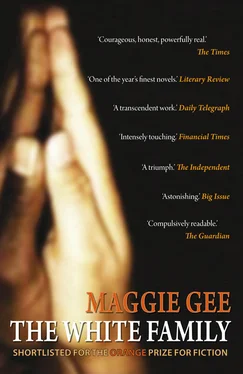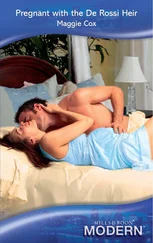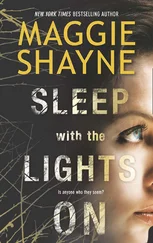Guilty, ashamed, he rang his bell, and the nurse came at once, tall, leaning forward as if she had lived her life in a hurry, a young coloured nurse who had bathed him this morning, though he’d told her he could manage alone –
But now he needed her again.
‘I’m sorry to be a trouble,’ he said. ‘Got myself in a pickle, here.’
She had washed his back where he couldn’t reach. Oddly enough, he hadn’t felt ashamed. But now he did. That stupid toy … And he shouldn’t have been fiddling around with it.
Now she would be doing his dirty work. May would have done it, if they’d been at home.
‘What a shame,’ the nurse said, in her low night voice, her low sweet voice, as she swept it up. ‘Did the family bring it? Never mind, Mr White.’
But Alfred did mind being old, and clumsy, and the tall young woman crawling round at his feet …
He must have slept for an hour or two, for when he looked at his watch, it was three a.m. He would never wake at that time, at home. The bars of light that criss-crossed the ceiling were turned down for the night, to a kind of dead salmon, dead fish stretching from side to side.
His stomach was suddenly gripped with anxiety. Dread, dread, fear and dread. A horrible time to be awake.
His head felt funny. He didn’t like to move in case he set it off, whatever might be coming, whatever horror was waiting for him. Blockages. Spreading. Pressure in his brain. There were funny feelings in his neck, his temples.
What he’d talked about to Thomas. Not a word of it was true. In Alfred’s mind the Park had gone dark. As he saw it now, everything was black. All he could remember was horror. Horror.
They had burned down the bandstand. A smoking wreck. With thatch like that, it would have gone like a torch. Just the iron was left. Black, buckled.
Then the children’s train. They’d poured petrol on it. The police worked it out after it was all over. When he was right over the other side of the Park, at lock-up time, closing the small gate on Leeson Road, they’d thrown lighted rags over the cemetery wall. He’d smelled something, then he’d heard the crackling, and come back at the double over the crown of the hill and saw it blazing, like a scene from a Western, the little train blazing orange and black. Soon there was only the black, and the mess, and the flecks of dark smut all over the Park.
The bigger lake, at the back of the café, which the council could never decide what to do with. It was a bit off the beaten track, but always a favourite spot, with Alfred. Once there had been irises, flags they used to call them, yellow or purple or a beautiful blue. And the grass kept short, and picnic tables. But it was a lot for the gardeners to look after, and then they cut down the number of gardeners, and if they had to skimp on anything, it made sense to do it in a part that didn’t show.
When the grass got long, and the weeds well-established, and the seats and tables were half-rotted through, some clever bugger down at the council decided it could be a Nature Reserve.
Nature Reserve! They made him laugh!
But it suited him to have it overgrown. That way he could slip away on his own and have a quiet thought, when things weren’t busy, a quiet sit on the rickety seat. There were always birds. Butterflies, lots of them, thick in the air once the nettles grew.
And frogs. He never took much notice of them. There had always been frogs, all over the Park, hopping like the snapping of a rubber band out from under his feet in odd damp places. They spawned in the lake, late February, March, and a few weeks later there’d be millions of tadders, flitting about like shooting-stars. People came and took spawn from the lake for their ponds, and there was so much of it, he turned a blind eye, though one day he’d had a horrible turn when he saw a plastic carrier hanging from the fence, and as he got closer it moved, it shook, and he thought Dear God it must be a baby , but when he brought himself to look inside, it was a bag of spawn and panicking frogs.
Then a few years ago — five, six? — something went funny with the spawn. They laid all right, mountains of it. It lay there glistening, and the frogs, worn out. But it never developed from full-stops to commas. The tadpoles never wriggled away. It lay in the water, and then it sank, and the eggs went white, and the water went milky, and then it darkened, it was black as black, and after a bit it started to stink. The next spring, the same thing happened. And the next.
He rang London Zoo, who were very nice, always very nice to a fellow professional. They told him it might be the ultra-violet. The ultra-violet in the sunlight. There was too much of it now, they said, and it was killing spawn all over the planet. ‘They’re like the canaries down the mine,’ the man said, having a bit of a laugh with Alfred. ‘They fall off the perch, and we’ll be next.’
Then Darren wrote that article, months later, about human sperm counts going down. (Darren needn’t worry; he had four children.) Thirty per cent since the war, he said. And sperm, after all, were very like tadpoles.
Are we dying, then? Shall we all die out?
Although he had to die, Alfred didn’t want that. He wanted a world for his grandchildren. (Not that he knew them. They wouldn’t remember him. That was a sadness, that they wouldn’t remember him. And now it was supposed to be all his fault. His fault that Darren never brought them to see him.)
And what kind of world would be there for them? At three in the morning, everything felt poisoned.
Outside the hospital, vandals abroad. Every summer, usually twice a year, he’d find the café in the Park broken into. Smashed glass, splintered wood, ice-cream smeared everywhere. It was kids who shinned over the fence at night, and Alfred would find it on his morning round. The cheery despair of his mate in the café.
As if we couldn’t stop them. Not any more. As if everything had gone too far.
(Dirk is a thug, and Darren hates me. You wrecked my life . Unfair, unfair.)
The things Alfred found. The things no one knew. The children would never understand, but the job was stressful, the job was hard. Was it surprising he sometimes let rip at home? –
Things he could no longer put out of his mind, as he lay awake under the queasy fluorescent.
A mass of blood and flesh in the bushes. He never decided what it was. Some poor girl, he thought, some poor girl — And they say there’s never been a death in the Park.
He was proud of Shirley. She never did that.
But her child was lost, and that was their fault, lost to the family, Alfred’s grandchild. And Shirley was different; she didn’t bear a grudge. Surely she at least didn’t bear a grudge. She would have brought the little one to see them …
He’d never told Shirley that he was sorry. Could never manage to get it out.
She wanted to keep it. We should have helped. I tried to talk to May, but she wouldn’t have it. She said the neighbours would never let it drop, but I said to her ‘May, stuff the neighbours.’ I gave it up though. May knew best.
Sorry, Shirley. I’m sorry, my duck .
Once Alfred had dreamed that the child came back. He could see she was theirs. She looked just like Shirley.
Ran for it. Legged it. If I were caught … Once we heard the sirens, I ran like crazy.
If they told my dad, I knew it would kill him. Or he’d kill me. That was my only thought.
We all split, in different directions. Well, none of the others came with me. I ran off up the hill where I could see better, up the hill where the moon was very bright, dipping and weaving between the trees, but I didn’t feel right, I was still bumping into things — Then down over the other side. I thought I’d shin over the gate on Leeson Road which isn’t as high as the other one. But then I thought the police might come that way. Sounded like two or three cars, to me, the fucking racket they were making, I don’t know what’s gone wrong with the police, waking up decent people in their beds –
Читать дальше












